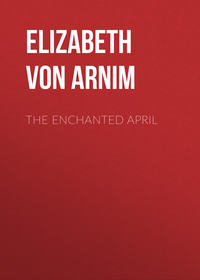 полная версия
полная версияIn the Mountains
September 2nd.
We've been a little strained all day in our relations because of yesterday. Dolly drooped at lunch, and for the first time didn't smile. Mrs. Barnes, I think, had been rebuking her with more than ordinary thoroughness. Evidently Mrs. Barnes is desperately anxious I shouldn't know about Siegfried. I wonder if there is any way of delicately introducing Germans into the conversation, and conveying to her that I have guessed about Dolly's husband and don't mind him a bit. Why should I mind somebody else's husband? A really nice woman only minds her own. But I know of no two subjects more difficult to talk about tactfully than Germans and husbands; and when both are united, as in this case, my courage rather fails.
We went for a dreary walk this afternoon. Mrs. Barnes was watchful, and Dolly was meek. I tried to be sprightly, but one can't be sprightly by oneself.
September 3rd.
In the night there was a thunderstorm, and for the first time since I got here I woke up to rain and mist. The mist was pouring in in waves through the open windows, and the room was quite cold. When I looked at the thermometer hanging outside, I saw it had dropped twenty degrees.
We have become so much used to fine weather arrangements that the sudden change caused an upheaval. I heard much hurrying about downstairs, and when I went down to breakfast found it was laid in the hall. It was like breakfasting in a tomb, after the radiance of our meals out of doors. The front door was shut; the rain pattered on the windows; and right up against the panes, between us and the world like a great grey flannel curtain, hung the mist. It might have been some particularly odious December morning in England.
'C'est l'automne,' said Antoine, bringing in three cane chairs and putting them round the tea-table on which the breakfast was laid.
'C'est un avertissement,' said Mrs. Antoine, bringing in the coffee.
Antoine then said that he had conceived it possible that Madame and ces dames might like a small wood fire. To cheer. To enliven.
'Pray not on our account,' instantly said Mrs. Barnes to me, very earnestly. 'Dolly and I do not feel the cold at all, I assure you. Pray do not have one on our account.'
'But wouldn't it be cosy—' I began, who am like a cat about warmth.
'I would far rather you did not have one,' said Mrs. Barnes, her features puckered.
'Think of all the wood!'
'But it would only be a few logs—'
'What is there nowadays so precious as logs? And it is far, far too early to begin fires. Why, only last week it was still August. Still the dog-days.'
'But if we're cold—'
'We should indeed be poor creatures, Dolly and I, if the moment it left off being warm we were cold. Please do not think we don't appreciate your kindness in wishing to give us a fire, but Dolly and I would feel it very much if our being here were to make you begin fires so early.'
'But—'
'Keep the logs for later on. Let me beg you.'
So we didn't have a fire; and there we sat, Mrs. Barnes with the white shawl at last put to its proper use, and all of us trying not to shiver.
After breakfast, which was taken away bodily, table and all, snatched from our midst by the Antoines, so that we were left sitting facing each other round empty space with a curious sensation of sudden nakedness, I supposed that Merivale would be produced, so I got up and pushed a comfortable chair conveniently for Dolly, and turned on the light.
To my surprise I found Mrs. Barnes actually preferred to relinquish the reading aloud rather than use my electric light in the daytime. It would be an unpardonable extravagance, she said. Dolly could work at her knitting. Neither of them needed their eyes for knitting.
I was greatly touched. From the first she has shown a touching, and at the same time embarrassing, concern not to cause me avoidable expense, but never yet such concern as this. I know what store she sets by the reading. Why, if we just sat there in the gloom we might begin to say things. I really was very much touched.
But indeed Mrs. Barnes is touching. It is because she is so touching in her desire not to give trouble, to make us happy, that one so continually does exactly what she wishes. I would do almost anything sooner than hurt Mrs. Barnes. Also I would do almost anything to calm her. And as for her adhesiveness to an unselfish determination, it is such that it is mere useless fatigue to try to separate her from it.
I have learned this gradually.
At first, most of my time at meals was spent in reassuring her that things hadn't been got specially on her and Dolly's account, and as the only other account they could have been got on was mine, my assurances had the effect of making me seem very greedy. I thought I lived frugally up here, but Mrs. Barnes must have lived so much more frugally that almost everything is suspected by her to be a luxury provided by my hospitality.
She was, for instance, so deeply persuaded that the apricots were got, as she says, specially, that at last to calm her I had to tell Mrs. Antoine to buy no more. And we all liked apricots. And there was a perfect riot of them down in the valley. After that we had red currants because they, Mrs. Barnes knew, came out of the garden; but we didn't eat them because we didn't like them.
Then there was a jug of lemonade sent in every day for lunch that worried her. During this period her talk was entirely of lemons and sugar, of all the lemons and sugar that wouldn't be being used if she and Dolly were again, in order to calm her, and rather than that she should be made unhappy, I told Mrs. Antoine to send in only water.
Cakes disappeared from tea a week ago. Eggs have survived at breakfast, and so has honey, because Mrs. Barnes can hear the chickens and has seen the bees and knows they are not things got specially. She will eat potatoes and cabbages and anything else that the garden produces with serenity, but grows restive over meat; and a leg of mutton made her miserable yesterday, for nothing would make her believe that if I had been here alone it wouldn't have been a cutlet.
'Let there be no more legs of mutton,' I said to Mrs. Antoine afterwards. 'Let there instead be three cutlets.'
I'm afraid Mrs. Antoine is scandalised at the inhospitable rigours she supposes me to be applying to my guests. My order to Antoine this morning not to light the fire will have increased her growing suspicion that I am developing into a cheese-paring Madame. She must have expressed her fears to Antoine; for the other day, when I told her to leave the sugar and lemons out of the lemonade and send in only the water, she looked at him, and as I went away I heard her saying to him in a low voice—he no doubt having told her I usedn't to be like this, and she being unable to think of any other explanation—'C'est la guerre.'
About eleven, having done little good by my presence in the hall whose cheerlessness wrung from me a thoughtless exclamation that I wished I smoked a pipe, upon which Dolly instantly said, 'Wouldn't it be a comfort,' and Mrs. Barnes said, 'Dolly,' I went away to the kitchen, pretending I wanted to ask what there was for dinner but really so as to be for a few moments where there was a fire.
Mrs. Antoine watched me warming myself with respectful disapproval.
'Madame devrait faire faire un peu de feu dans la halle,' she said. 'Ces dames auront bien froid.'
'Ces dames won't let me,' I tried to explain in the most passionate French I could think of. 'Ces dames implore me not to have a fire. Ces dames reject a fire. Ces dames defend themselves against a fire. I perish because of the resolve of ces dames not to have a fire.'
But Mrs. Antoine plainly didn't believe me. She thought, I could see, that I was practising a repulsive parsimony on defenceless guests. It was the sorrows of the war, she concluded, that had changed Madame's nature. This was the kindest, the only possible, explanation.
Evening.
There was a knock at my door just then. I thought it must be Mrs. Antoine come to ask me some domestic question, and said Entrez, and it was Mrs. Barnes.
She has not before this penetrated into my bedroom. I hope I didn't look too much surprised. I think there could hardly have been a gap of more than a second between my surprise and my recovered hospitality.
'Oh—do come in,' I said. 'How nice of you.'
Thus do the civilised clothe their real sensations in splendid robes of courtesy.
'Dolly and I haven't driven you away from the hall, I hope?' began Mrs. Barnes in a worried voice.
'I only came up here for a minute,' I explained, 'and was coming down again directly.'
'Oh, that relieves me. I was afraid perhaps—'
'I wish you wouldn't so often be afraid you're driving me away,' I said pleasantly. 'Do I look driven?'
But Mrs. Barnes took no notice of my pleasantness. She had something on her mind. She looked like somebody who is reluctant and yet impelled.
'I think,' she said solemnly, 'that if you have a moment to spare it might be a good opportunity for a little talk. I would like to talk with you a little.'
And she stood regarding me, her eyes full of reluctant but unconquerable conscientiousness.
'Do,' I said, with polite enthusiasm. 'Do.'
This was the backwash, I thought, of Dolly's German outbreak the other day, and Siegfried was going at last to be explained to me.
'Won't you sit down in this chair?' I said, pushing a comfortable one forward, and then sitting down myself on the edge of the sofa.
'Thank you. What I wish to say is—'
She hesitated. I supposed her to be finding it difficult to proceed with Siegfried, and started off impulsively to her rescue.
'You know, I don't mind a bit about—' I began.
'What I wish to say is,' she went on again, before I had got out the fatal word, 'what I wish to point out to you—is that the weather has considerably cooled.'
This was so remote from Siegfried that I looked at her a moment in silence. Then I guessed what was coming, and tried to put it off.
'Ah,' I said—for I dreaded, the grateful things she would be sure to say about having been here so long—'you do want a fire in the hall after all, then.'
'No, no. We are quite warm enough, I assure you. A fire would distress us. What I wish to say is—' Again she hesitated, then went on more firmly, 'Well, I wish to say that the weather having broken and the great heat having come to an end, the reasons which made you extend your kind, your delightful hospitality to us, have come to an end also. I need hardly tell you that we never, never shall be able to express to you—'
'Oh, but you're not going to give me notice?' I interrupted, trying to be sprightly and to clamber over her rock-like persistence in gratitude with the gaiety of a bright autumnal creeper. This was because I was nervous. I grow terribly sprightly when I am nervous.
But indeed I shrink from Mrs. Barnes's gratitude. It abases me to the dust. It leaves me mourning in much the same way that Simon Lee's gratitude left Wordsworth mourning. I can't bear it. What a world it is, I want to cry out,—what a miserable, shameful, battering, crushing world, when so dreadfully little makes people so dreadfully glad!
Then it suddenly struck me that the expression giving notice might not be taken by Mrs. Barnes, she being solemn, in the spirit in which it was offered by me, I being sprightly; and, desperately afraid of having possibly offended her, I seized on the first thing I could think of as most likely to soothe her, which was an extension, glowing and almost indefinite, of my invitation. 'Because, you know,' I said, swept along by this wish to prevent a wound, 'I won't accept the notice. I'm not going to let you go. That is, of course,' I added, 'if you and Dolly don't mind the quiet up here and the monotony. Won't you stay on here till I go away myself?'
Mrs. Barnes opened her mouth to speak, but I got up quickly and crossed over to her and kissed her. Instinct made me go and kiss her, so as to gain a little time, so as to put off the moment of having to hear whatever it was she was going to say; for whether she accepted the invitation or refused it, I knew there would be an equally immense, unbearable number of grateful speeches.
But when I went over and kissed her Mrs. Barnes put her arm round my neck and held me tight; and there was something in this sudden movement on the part of one so chary of outward signs of affection that made my heart give a little leap of response, and I found myself murmuring into her ear—amazing that I should be murmuring into Mrs. Barnes's ear—'Please don't go away and leave me—please don't—please stay—'
And as she didn't say anything I kissed her again, and again murmured, 'Please—'
And as she still didn't say anything I murmured, 'Won't you? Say you will—'
And then I discovered to my horror that why she didn't say anything was because she was crying.
I have been slow and unimaginative about Mrs. Barnes. Having guessed that Dolly was a German widow I might so easily have guessed the rest: the poverty arising out of such a situation, the vexations and humiliations of the attitude of people in the pensions she has dragged about in during and since the war,—places in which Dolly's name must needs be registered and her nationality known; the fatigue and loneliness of such a life, with no home anywhere at all, forced to wander and wander, her little set at Dulwich probably repudiating her because of Dolly; or scolding her, in rare letters, for the folly of her sacrifice; with nothing to go back, to and nothing to look forward to, and the memory stabbing her always of the lost glories of that ordered life at home in her well-found house, with the church bells ringing on Sundays, and everybody polite, and a respectful crossing-sweeper at the end of the road.
All her life Mrs. Barnes has been luminously respectable. Her respectability has been, I gather from things she has said, her one great treasure. To stand clear and plain before her friends, without a corner in her actions that needed defending or even explaining, was what the word happiness meant to her. And now here she is, wandering about in a kind of hiding. With Dolly. With the beloved, the difficult, the unexplainable Dolly. Unwelcomed, unwanted, and I daresay quite often asked by the many pension proprietors who are angrily anti-German to go somewhere else.
I have been thick-skinned about Mrs. Barnes. I am ashamed. And whether I have guessed right or wrong she shall keep her secrets. I shall not try again, however good my silly intentions may seem to me, however much I may think it would ease our daily intercourse, to blunder in among things about which she wishes to be silent. When she cried like that this morning, after a moment of looking at her bewildered and aghast, I suddenly understood. I knew what I have just been writing as if she had told me. And I stroked her hand, and tried to pretend I didn't notice anything, because it was so dreadful to see how she, for her part, was trying so very hard to pretend she wasn't crying. And I kept on saying—for indeed I didn't know what to say—'Then you'll stay—how glad I am—then that's settled—'
And actually I heard myself expressing pleasure at the certainty of my now hearing Merivale to a finish!
How the interview ended was by my conceiving the brilliant idea of going away on the pretext of giving an order, and leaving Mrs. Barnes alone in my room till she should have recovered sufficiently to appear downstairs.
'I must go and tell Mrs. Antoine something,' I suddenly said,—'something I've forgotten.' And I hurried away.
For once I had been tactful. Wonderful. I couldn't help feeling pleased at having been able to think of this solution to the situation. Mrs. Barnes wouldn't want Dolly to see she had been crying. She would stay up quietly in my room till her eyes had left off being red, and would then come down as calm and as ready to set a good example as ever.
Continuing to be tactful, I avoided going into the hall, because in it was Dolly all by herself, offering me my very first opportunity for the talk alone with her that I have so long been wanting; but of course I wouldn't do anything now that might make Mrs. Barnes uneasy; I hope I never may again.
To avoid the hall, however, meant finding myself in the servants' quarters. I couldn't take shelter in the kitchen and once more warm myself, because it was their dinner hour. There remained the back door, the last refuge of a hostess. It was open; and outside was the yard, the rain, and Mou-Mou's kennel looming through the mist.
I went and stood in the door, contemplating what I saw, waiting till I thought Mrs. Barnes would have had time to be able to come out of my bedroom. I knew she would stay there till her eyes were ready to face the world again, so I knew I must have patience. Therefore I stood in the door and contemplated what I saw from it, while I sought patience and ensued it. But it is astonishing how cold and penetrating these wet mountain mists are. They seem to get right through one's body into one's very spirit, and make it cold too, and doubtful of the future.
September 4th.
Dolly looked worried, I thought, yesterday when Mrs. Barnes, as rocky and apparently arid as ever—but I knew better—told her at tea-time in my presence that I had invited them to stay on as long as I did.
There were fortunately few expressions of gratitude this time decorating Mrs. Barnes's announcement. I think she still wasn't quite sure enough of herself to be anything but brief. Dolly looked quickly at me, without her usual smile. I said what a great pleasure it was to know they weren't going away. 'You do like staying, don't you, Dolly?' I asked, breaking off suddenly in my speech, for her serious eyes were not the eyes of the particularly pleased.
She said she did; of course she did; and added the proper politenesses. But she went on looking thoughtful, and I believe she wants to tell me, or have me told by Mrs. Barnes, about Siegfried. I think she thinks I ought to know what sort of guest I've got before deciding whether I really want her here any longer or not.
I wish I could somehow convey to Dolly, without upsetting Mrs. Barnes, that I do know and don't mind. I tried to smile reassuringly at her, but the more I smiled the more serious she grew.
As for Mrs. Barnes, there is now between her and me the shyness, the affection, of a secret understanding. She may look as arid and stiff as she likes, but we have kissed each other with real affection and I have felt her arm tighten round my neck. How much more enlightening, how much more efficacious than any words, than any explanations, is that very simple thing, a kiss. I believe if we all talked less and kissed more we should arrive far quicker at comprehension. I give this opinion with diffidence. It is rather a conjecture than an opinion. I have not found it shared in literature—in conversation I would omit it—except once, and then by a German. He wrote a poem whose first line was:
O schwöre nicht und küsse nurAnd I thought it sensible advice.
September 5th.
The weather after all hasn't broken. We have had the thunderstorm and the one bad day, and then it cleared up. It didn't clear up back to heat again—this year there will be no more heat—but to a kind of cool, pure gold. All day yesterday it was clearing up, and towards evening there came a great wind and swept the sky clear during the night of everything but stars; and when I woke this morning there was the familiar golden patch on the wall again, and I knew the day was to be beautiful.
And so it has been, with the snow come much lower down the mountains, and the still air very fresh. Things sparkle; and one feels like some bright bubble of light oneself. Actually even Mrs. Barnes has almost been like that,—has been, for her, astonishingly, awe-inspiringly gay.
'Ah,' she said, standing on the terrace after breakfast, drawing in deep draughts of air, 'now I understand the expression so frequently used in descriptions of scenery. This air indeed is like champagne.'
'It does make one feel very healthy,' I said.
There were several things I wanted to say instead of this, things suggested by her remark, but I refrained. I mean to be careful now to let my communications with Mrs. Barnes be Yea, yea and Nay, nay—that is, straightforward and brief, with nothing whatever in them that might directly or indirectly lead to the encouragement of Dolly. Dolly has been trying to catch me alone. She has tried twice since Mrs. Barnes yesterday at tea told her I had asked them to stay on, but I have avoided her.
'Healthy?' repeated Mrs. Barnes. 'It makes one feel more than healthy. It goes to one's head. I can imagine it turning me quite dizzy—quite turning my head.'
And then she actually asked me a riddle—Mrs. Barnes asked a riddle, at ten o'clock in the morning, asked me, a person long since callous to riddles and at no time since six years old particularly appreciative of them.
Of course I answered wrong. Disconcerted, I impetuously hazarded Brandy as the answer, when it should have been Whisky; but really I think it was wonderful to have got even so near the right answer as Brandy. I won't record the riddle. It was old in Mrs. Barnes's youth, for she told me she had it from her father, who, she said, could enjoy a joke as heartily as she can herself.
But what was so surprising was that the effect of the crisp, sunlit air on Mrs. Barnes should be to engender riddles. It didn't do this to my pre-war guests. They grew young, but not younger than twenty. Mrs. Barnes to-day descended to the age of bibs. I never could have believed it of her. I never could have believed she would come so near what I can only call an awful friskiness. And it wasn't just this morning, in the first intoxication of the splendid new air; it has gone on like it all day. On the mountain slopes, slippery now and difficult to walk on because of the heavy rain of the thunderstorm, might have been seen this afternoon three figures, two black ones and a white one, proceeding for a space in a rather wobbly single file, then pausing in an animated group, then once more proceeding. When they paused it was because Mrs. Barnes had thought of another riddle. Dolly was very quick at the answers,—so quick that I suspected her of having been brought up on these very ones, as she no doubt was, but I cut a lamentable figure. I tried to make up for my natural incapacity by great goodwill. Mrs. Barnes's spirits were too rare and precious, I felt, not to be welcomed; and having failed in answers I desperately ransacked my memory in search of questions, so that I could ask riddles too.
But by a strange perversion of recollection I could remember several answers and not their questions. In my brain, on inquiry, were fixed quite firmly things like this,—obviously answers to what once had been riddles.
Because his tail comes out of his head.So did the other donkey.He took a fly and went home.Orleans.Having nothing else to offer Mrs. Barnes I offered her these, and suggested she should supply the questions.
She thought this way of dealing with riddles subversive and difficult. Dolly began to laugh. Mrs. Barnes, filled with the invigorating air, actually laughed too. It was the first time I have heard her laugh. I listened with awe. Evidently she laughs very rarely, for Dolly looked so extraordinarily pleased; evidently her doing it made to-day memorable, for Dolly's face, turned to her sister in a delighted surprise, had the expression on it that a mother's has when her offspring suddenly behaves in a way unhoped for and gratifying.
So there we stood, gesticulating gaily on the slippery slope.
This is a strange place. Its effects are incalculable. I suppose it is because it is five thousand feet up, and has so great a proportion of sunshine.
September 6th.
There were letters this morning from England that wiped out all the gaiety of yesterday; letters that reminded me. It was as if the cold mist had come back again, and blotted out the light after I had hoped it had gone for good. It was as if a weight had dropped down again on my heart, suffocating it, making it difficult to breathe, after I had hoped it was lifted off for ever. I feel sick. Sick with the return of the familiar pain, sick with fear that I am going to fall back hopelessly into it. I wonder if I am. Oh, I had such hope that I was better! Shall I ever get quite well again? Won't it at best, after every effort, every perseverance in struggle, be just a more or less skilful mending, a more or less successful putting together of broken bits? I thought I had been growing whole. I thought I wouldn't any longer wince. And now these letters....









